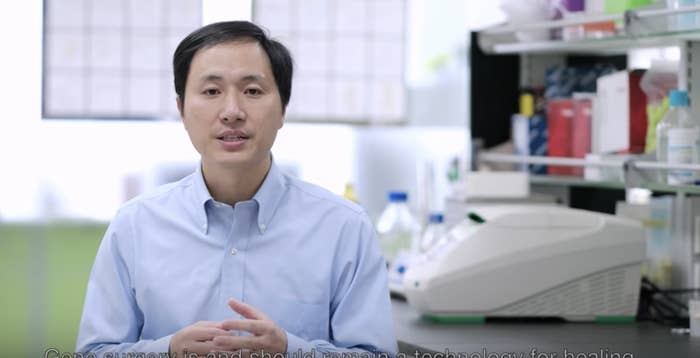
A Chinese scientist who is claiming to have helped create the world's first genetically edited babies is under investigation for possibly violating academic ethics at the university he is affiliated with.
He Jiankui claimed that he used gene-editing tools to create two twin girls — born earlier this month — whose DNA was engineered to have the capability to thwart HIV and AIDS.
MIT's Technology Review first reported that He led a team of scientists at the Southern University of Science and Technology in Shenzhen, China, who began sharing their work a few weeks ago, documenting how they had been recruiting couples to create the first gene-edited babies.
He then announced the successful birth of twins Lulu and Nana on YouTube and expounded upon the stunning scientific leap in an interview with the Associated Press on Monday.
However, in a statement Monday, the Southern University of Science and Technology said that it was unaware of He's research project, which was conducted outside the campus. He had also not reported his research to the university, the statement said.
The university said that it was "deeply shocked by this event" and had reached out to He — who has been on unpaid leave from the university's biology department since February this year through January 2021— for clarification.
The university said that its Department of Biology Academic Committee "believes that Dr. Jiankui HE’s conduct in utilizing CRISPR/Cas9 to edit human embryos has seriously violated academic ethics and codes of conduct."
"The University will call for international experts to form an independent committee to investigate this incident, and to release the results to the public," the statement said.
Gene editing is a highly controversial topic that has alarmed many scientists, not only because of its ethical murkiness, but also because they argue that the process could have harmful, unknown genetic ramifications, as those edited genes could change the DNA of future generations.
The scientists' goal, He explained, was not to cure or prevent an inherited disease, but to give the embryos the rare capability to fight off contracting HIV.
“I feel a strong responsibility that it’s not just to make a first, but also make it an example,” He told the AP. “Society will decide what to do next.”
Altering genes is banned in the US. In 2016, the director of the National Institutes of Health (NIH) said the concept of making “designer babies” raised grave ethical concerns about the belief that human beings have the right and ability to begin editing our own species.
Dr. Kiran Musunuru, a University of Pennsylvania gene editing expert, told the AP that the experiment is “unconscionable.” Other experts, however, say the science could have a monumental impact on public health, especially if parents with devastating, inheritable diseases have a chance at saving their children.
He has pushed back on the term “designer babies,” arguing that it diminishes the work and that his team has no desire to “design” children.
“[These parents] carry a lethal genetic disease. Often a small mistake in a single gene of 20,000,” the researcher said in a YouTube video on Monday. “If we can help these parents protect their children it's inhuman for us not to.”
The mother in the experiment, Grace, got pregnant through “regular IVF,” He explained in the YouTube video, but with one significant difference.
“After we sent her husband's sperm into her egg we also sent in a little bit of protein and instructions for a gene surgery,” the scientist said. “When Lulu and Nana were just a single cell this surgery removed a doorway through which HIV enters to infect people.”
A few days later, the team checked to see how the embryo fared before putting it back into Grace's womb. The mother went on to have a normal pregnancy and then gave birth to two healthy baby girls, he said.
The babies' father, Mark, never thought he would be able to have “a normal life” with kids, the scientist said, because he has HIV.
“Mark and Grace couldn't bear to bring a child into that world of fear,” He said.
The scientists recruited this couple, along with several others, through a Beijing-based AIDS advocacy group. According to the AP, He edited 16 out of 22 embryos and 11 were used in six attempted implants before Mark and Grace's successful pregnancy.
However, the team's claims and results have yet to be verified and the experiment has not been published in any scientific journal.
The AP gave several scientists materials from He for review, and the outlet reported that the experts said that, so far, the tests “are insufficient to say the editing worked or to rule out harm.”

